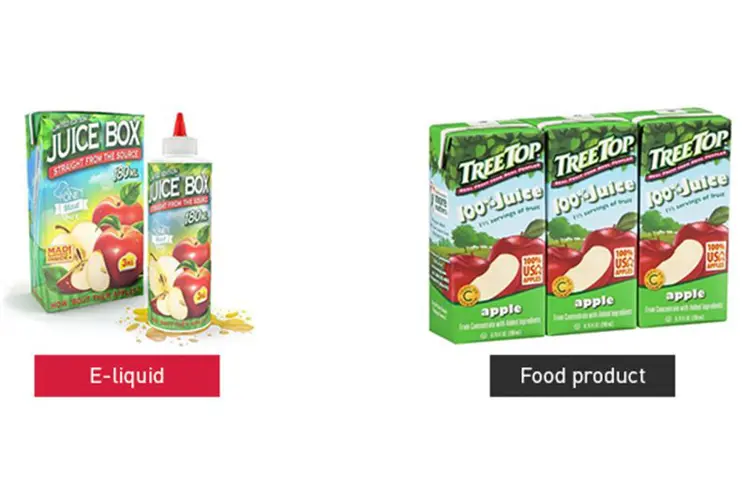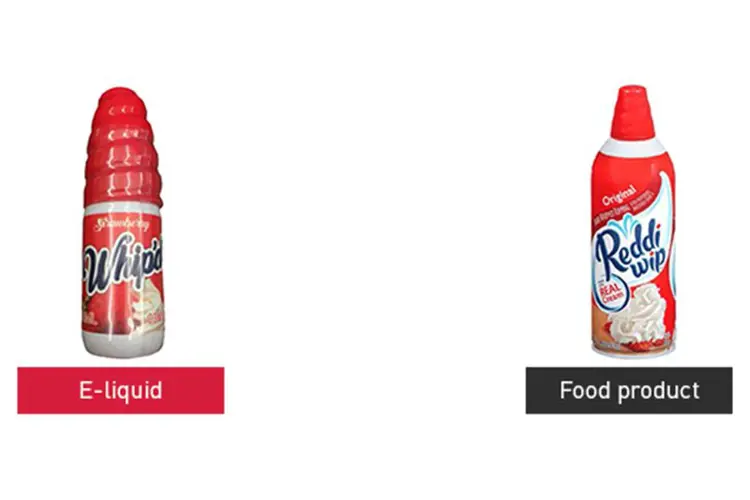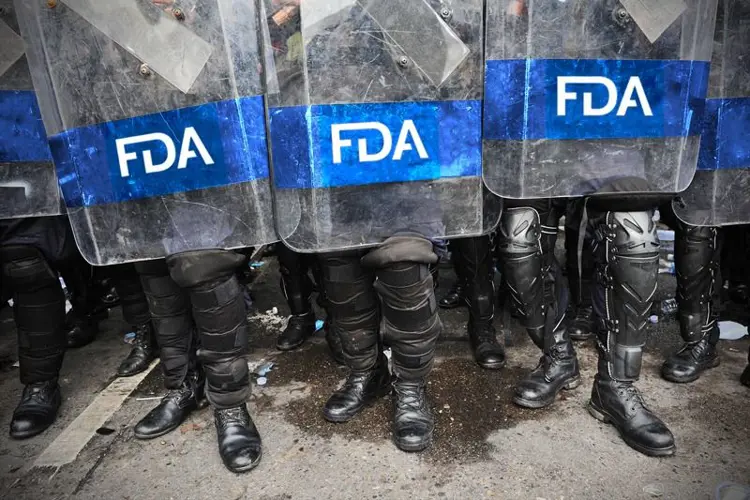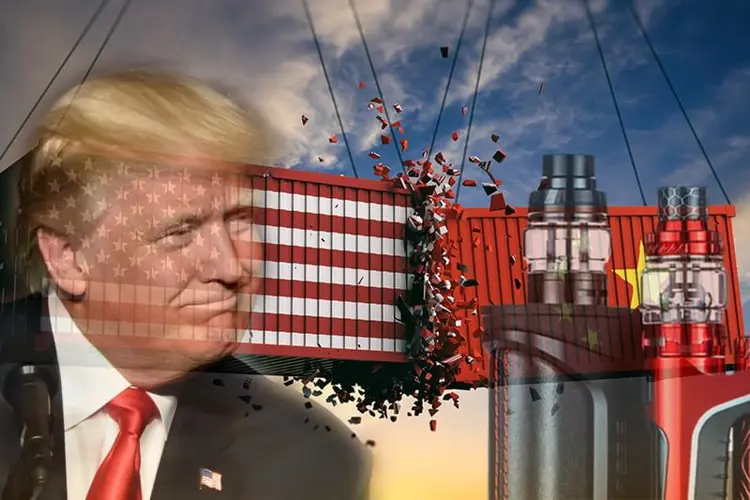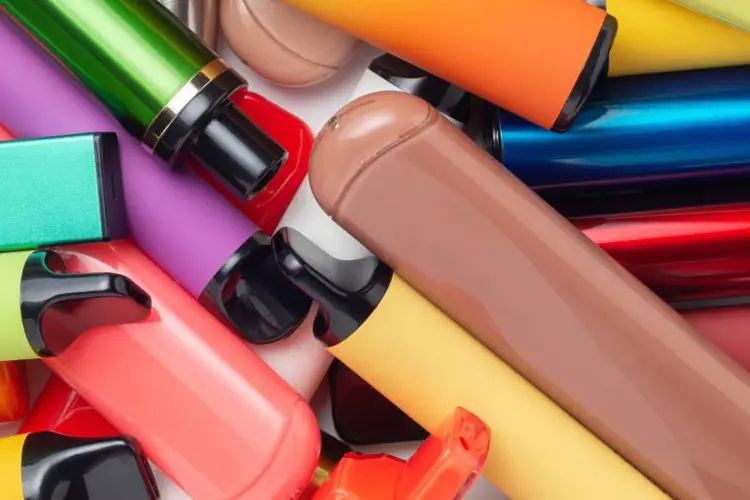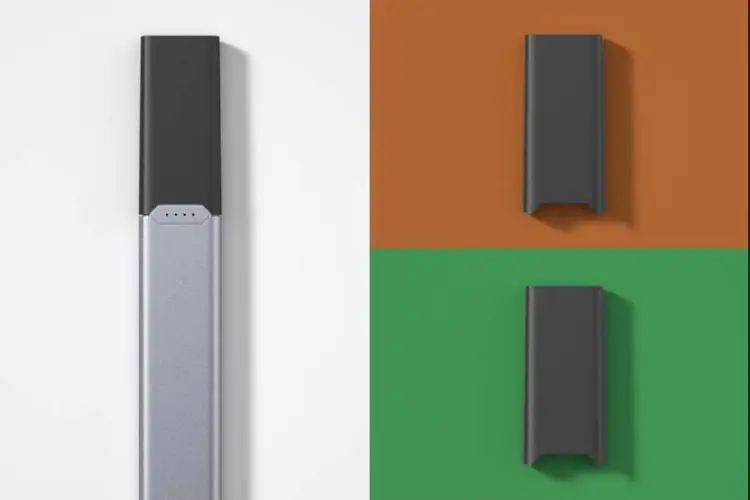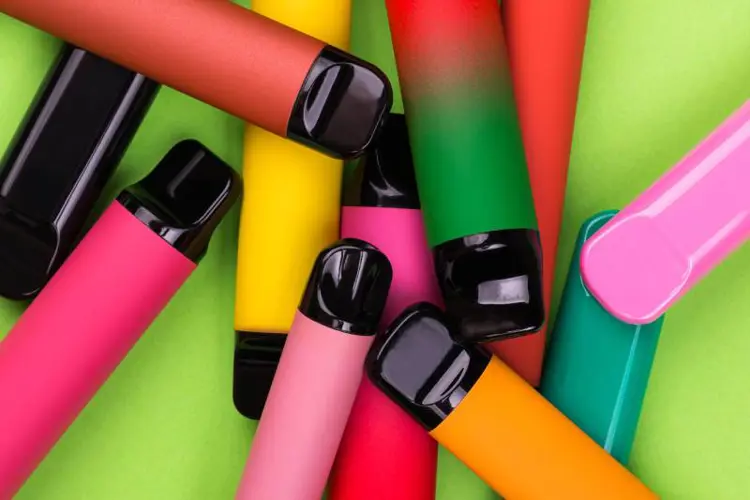The FDA has expanded its enforcement actions on the e-cigarette industry to go after e-liquid labels that look like recognizable food, candy, and drinks. And today’s action may just be the first round.
“As part of ongoing efforts to protect youth from the dangers of nicotine and tobacco products,” says the FDA press release, “today the U.S. Food and Drug Administration and the Federal Trade Commission (FTC) issued 13 warning letters to manufacturers, distributors, and retailers for selling e-liquids used in e-cigarettes with labeling and/or advertising that cause them to resemble kid-friendly food products, such as juice boxes, candy or cookies, some of them with cartoon-like imagery.”
As noted in the press statement, the action is a joint effort by the FDA and the Federal Trade Commission. The FTC is involved because that agency regulates unfair or deceptive trade practices, including advertising and marketing. The agencies have targeted some of the most egregious examples of foolish marketing practices in the e-liquid industry, including label images that clearly attempt to imitate actual food products.
Despite the similarity of some of these labels to well-known products, the FDA and FTC are not charging the companies with intellectual property violations. Protection of trademarks like names, logos and images from labels is the responsibility of the IP owners, not these federal agencies. The vape manufacturers that received warning letters have been singled out for safety concerns, because their product labels look like candy, food and drinks that are commonly eaten by children.
“Looking at these side-to-side comparisons is alarming,” said FDA Commissioner Scott Gottlieb. “It is easy to see how a child could confuse these e-liquid products for something they believe they’ve consumed before – like a juice box.”
The issue is not e-liquid companies “marketing to children,” but marketing a product that could be mistaken by a child for a food product. The FDA is not banning candy or food flavors — although they may also do that eventually — but making it known that label images shouldn’t look like familiar candy and food products.
The action comes less than a week after the FDA announced that it had sent a formal request to JUUL Labs requesting information on that company’s popular pod vape JUUL. The agency asked the vape manufacturer to provide “documents related to product marketing; research on the health, toxicological, behavioral or physiologic effects of the products, including youth initiation and use; whether certain product design features, ingredients or specifications appeal to different age groups; and youth-related adverse events and consumer complaints associated with the products.”
JUUL was given till June 19 to provide the information requested in the FDA letter. The e-liquid manufacturers have just 15 days to respond to the agency, “describing your corrective actions, including the dates on which you discontinued the violative labeling, advertising, sale, and/or distribution of these tobacco products and your plan for maintaining compliance with the [Food, Drug, and Cosmetic] Act.”
These companies won’t find much sympathy from already pressured vaping advocates.
The manufacturers that received warning letters were:
- NEwhere Inc./Mad Hatter Juice - One Mad Hit Juice Box
- Drip More LLC - Candy King Batch and Candy King Sour Worms
- Candy Co E-Liquids - Patches by Candy Co.
- 7 Daze, LLC - Pink Sticks
- Tinted Brew, Inc - V’Nilla Cookies & Milk
- Next Day Vapor Products (owned by Cosmic Fog Vapors LLC) - Whip’d Strawberry
- Omnia E-Liquid - Twirly Pop
- Warrender Enterprise Inc./Lifted Liquids and E-Liquid Retail - Vape Heads Sour Smurf Sauce
The agencies also sent warning letters to retailers and distributors that sell the products in question, all of whom were also cited for selling to minors. Those companies were:
- On Cloud Vape
- Sugoi Vapor
- Fog It Up
- Elite Vaporworks
- Ultimate Vape Deals
Omnia E-Liquid, in addition to manufacturing one of the products in question, was also cited for selling to a minor.
If the companies don’t reply, or refuse to correct the violations, they will be subject to further enforcement actions, including having their products seized, or even being shut down. And retailers with these products on their shelves had better think twice about leaving them there as the FDA steps up compliance enforcement in shops.
These companies won’t find much sympathy from already pressured vaping advocates. American Vaping Association president Gregory Conley issued a statement calling out these manufacturers’ “crass, bottom feeding marketing,” and expressing concern “that the agency will expand their campaign to include responsibly marketed flavored products that are popular with adults looking for alternatives to combustible cigarettes." Those
With the FDA poised to restrict or ban e-liquid flavors, and the industry’s biggest player JUUL apparently unwilling to fight back against a coordinated smear campaign, e-liquid manufacturers who are serious about their future might want to rethink any labels that look like something a toddler might want to drink.
The Freemax REXA PRO and REXA SMART are highly advanced pod vapes, offering seemingly endless features, beautiful touchscreens, and new DUOMAX pods.
The OXVA XLIM Pro 2 DNA is powered by a custom-made Evolv DNA chipset, offering a Replay function and dry hit protection. Read our review to find out more.
The SKE Bar is a 2 mL replaceable pod vape with a 500 mAh battery, a 1.2-ohm mesh coil, and 35 flavors to choose from in 2% nicotine.
Because of declining cigarette sales, state governments in the U.S. and countries around the world are looking to vapor products as a new source of tax revenue.
The legal age to buy e-cigarettes and other vaping products varies around the world. The United States recently changed the legal minimum sales age to 21.
A list of vaping product flavor bans and online sales bans in the United States, and sales and possession bans in other countries.

